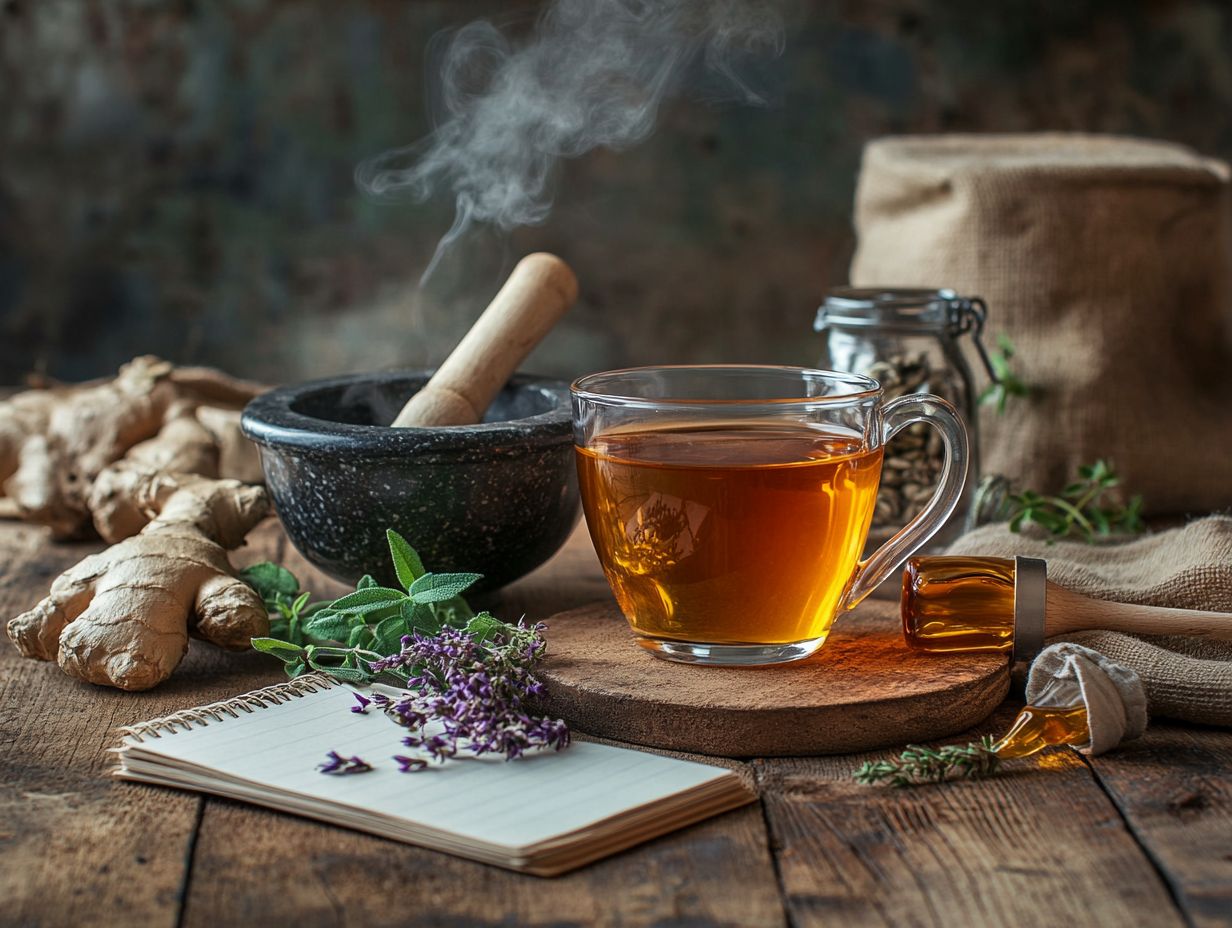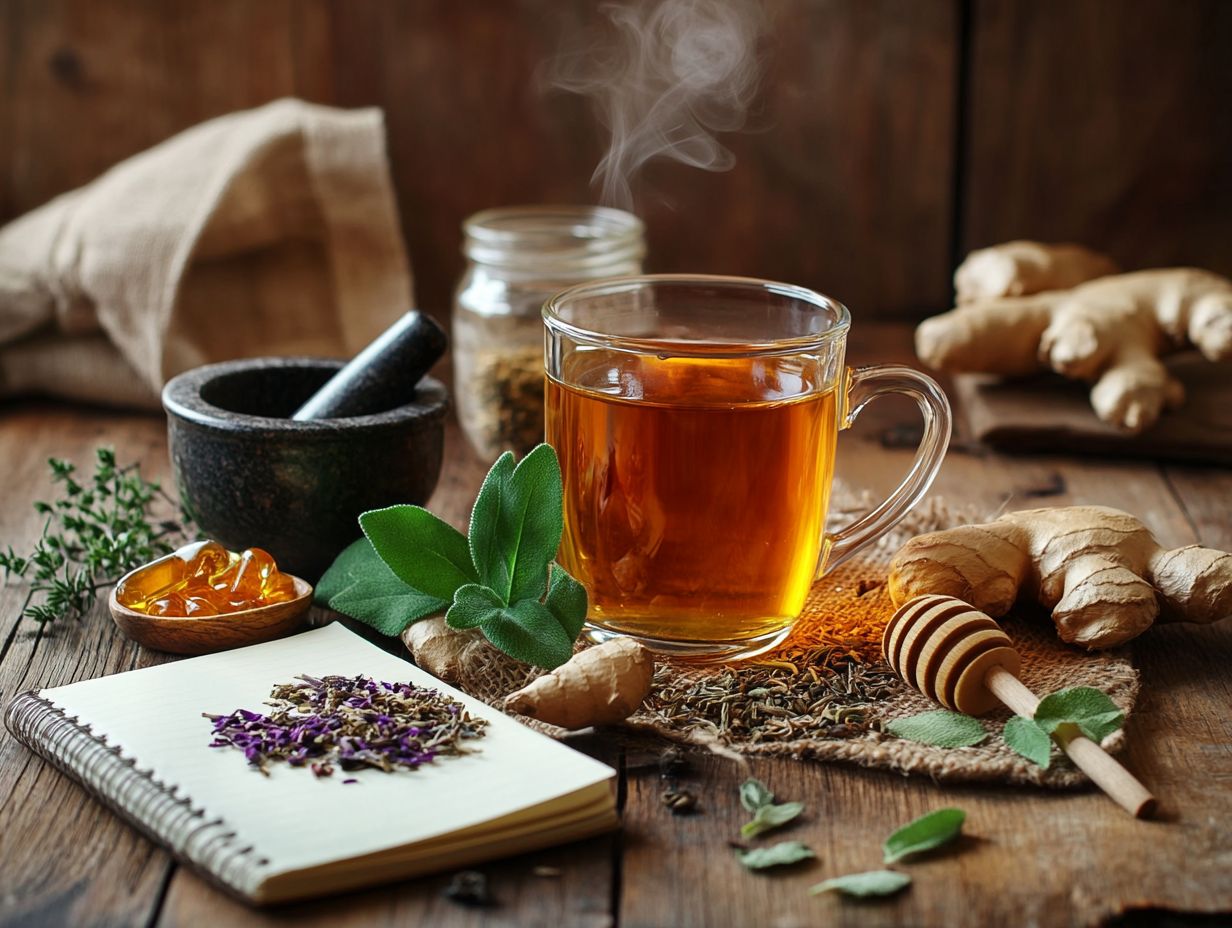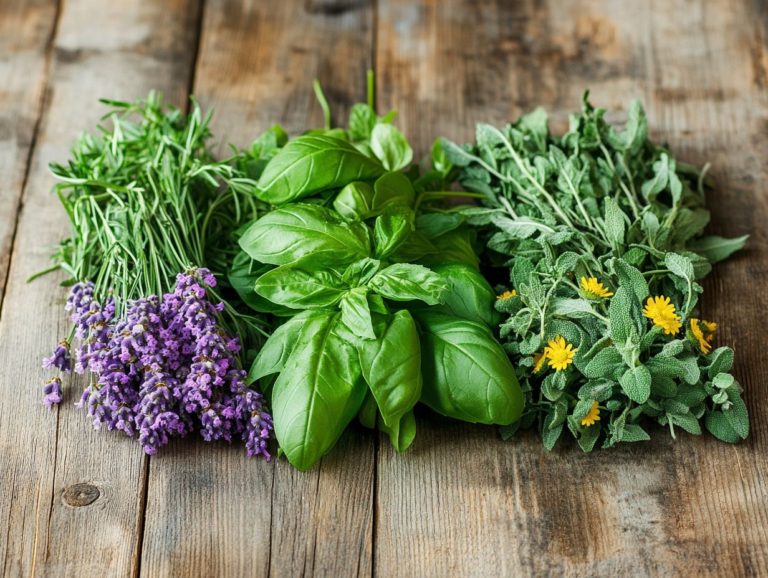Herbal Remedies for Cough: What Works?
Coughing can be an irritating and often disruptive symptom, indicating anything from a common cold to allergies. Understanding the various types of cough and their underlying causes is crucial for effective treatment.
This article delves into common triggers, highlights herbal remedies, and offers insights into the best herbs for soothing both dry and wet coughs. It also explores alternative natural remedies, providing you with a holistic approach to managing your cough.
Immerse yourself in this information to discover the relief you seek.
Contents
Key Takeaways:

- Herbal remedies can effectively relieve cough of all types, whether dry or wet.
- Besides traditional herbs such as ginger and honey, lesser-known herbs like marshmallow root and thyme can also soothe cough.
- For a holistic approach to treating cough, consider alternative methods like steam inhalation, saltwater gargles, and acupuncture.
Understanding Cough and Its Causes
Understanding cough and its many causes is essential for effectively identifying and managing this prevalent symptom linked to both short-term illnesses like the cold or flu and chronic conditions such as asthma and Chronic Obstructive Pulmonary Disease (COPD).
Coughing can arise from various triggers, including respiratory infections, irritants, and underlying health concerns. Therefore, it’s vital to differentiate between the types of cough to discover appropriate treatments and remedies tailored to your needs.
Types of Cough
Coughs can be broadly categorized into two main types: dry coughs and wet coughs. Each necessitates distinct treatment approaches and care strategies.
A dry cough often manifests as a persistent tickle in your throat, lacking any mucus production. In contrast, a wet cough produces mucus or phlegm and may bring about a sensation of tightness in your chest.
The causes of a dry cough vary significantly, ranging from allergies and viral infections to environmental irritants. A wet cough is typically associated with conditions such as bronchitis or respiratory infections.
Regarding treatment options, dry coughs often respond favorably to cough suppressants or soothing throat lozenges. Wet coughs usually require expectorants to assist in clearing mucus.
Knowing these differences can change how you tackle your cough!
Common Causes of Cough
Several factors contribute to your cough, ranging from common illnesses like the flu and cold to chronic conditions such as asthma and COPD, which often lead to inflammation and irritation in your respiratory tract.
Acute respiratory infections can hit you with a sudden cough, signaling your body s effort to expel mucus or irritants. Viral infections are notorious for causing inflammation, making your airways more sensitive.
Chronic conditions like asthma constrict airways, making it difficult for you to breathe freely, often resulting in a persistent cough. Even conditions like gastroesophageal reflux disease (GERD) can irritate your throat, leading to chronic coughing.
Understanding these underlying health issues is essential, as they can significantly affect your overall respiratory health and quality of life.
Herbal Remedies for Cough

Herbal remedies for cough have become increasingly sought after as natural alternatives to conventional treatments. You may find yourself drawn to these options to enhance your health and well-being while minimizing the side effects often linked to pharmaceutical medications.
Explore these herbal remedies and find what works best for you!
Effectiveness and Benefits
The effectiveness of herbal remedies as cough suppressants is backed by a wealth of studies that underscore their health benefits, including herbal remedies for stress relief and therapeutic properties.
Many of these natural solutions have demulcent qualities, which means they can coat your throat and ease the irritation and discomfort commonly linked to coughing.
For example, herbs like slippery elm and marshmallow root have gained quite a following for their soothing effects, making them favored choices among those seeking relief.
Scientific research has indicated that these remedies can serve as a viable alternative to traditional medications, often with fewer side effects. Many people report feeling better when choosing these herbal options.
This suggests that nature’s own remedies can be just as effective, if not more so, when it comes to managing cough symptoms.
Herbs for Dry Cough
If you re dealing with a dry cough, try using herbs known for their exceptional soothing properties.
Marshmallow root and slippery elm are particularly revered for their ability to provide relief to your throat and respiratory tract, offering the comfort you need during such discomforting moments.
Best Herbs for Soothing Dry Cough
The finest herbs for soothing a dry cough include marshmallow root, slippery elm, and ginger, each that help ease symptoms.
Marshmallow root is rich in mucilage, a gel-like substance that soothes the throat. It provides a comforting coat to your throat, easing irritation and inflammation.
Similarly, slippery elm offers soothing qualities that can significantly reduce the discomfort of a sore throat.
Ginger, celebrated for its anti-inflammatory properties, not only helps in minimizing irritation but can also aid in loosening mucus.
Prepare herbal remedies by steeping dried marshmallow root or slippery elm bark in hot water. Enjoy this soothing tea two to three times a day.
For fresh ginger, slice or grate about an inch of root per cup of tea. Just a gentle reminder: overindulging in ginger may lead to stomach upset or heartburn, especially for those who are more sensitive.
Herbs for Wet Cough

Wet coughs, often marked by the production of mucus, can greatly benefit from the use of herbs such as thyme and bromelain.
These natural remedies assist in reducing mucus and facilitating easier breathing, enhancing your overall comfort during recovery.
Top Herbs for Relieving Wet Cough
The top herbs for relieving a wet cough include thyme, peppermint, and turmeric, each recognized for their remarkable ability to ease symptoms and enhance respiratory health.
Take thyme, for example; its antimicrobial properties can help you combat infections.
Meanwhile, peppermint, with its menthol content, works wonders in soothing irritated airways and making breathing a whole lot easier.
Turmeric, known for its anti-inflammatory qualities, can assist in reducing the throat inflammation that often tags along with those pesky wet coughs.
You can prepare these herbs as soothing herbal teas, infuse them in honey, or even add them to steam inhalation sessions for maximum benefit.
Mixing these herbs with honey or ginger can elevate their effectiveness, creating a powerful blend that supports lung health and provides comfort during those annoying cough episodes.
Other Natural Remedies for Cough
Along with herbal remedies, you can also try other natural methods that effectively alleviate cough symptoms.
Consider steam treatments, saltwater gargles, and warm broths each offering its own unique benefits to enhance your comfort and well-being.
If your cough persists, consult a healthcare professional for further advice.
Alternative Approaches to Treating Cough
You can try treating a cough with steam treatments, saltwater gargles, or hot liquids. Each method can soothe your symptoms.
Steam treatment can be achieved through inhalation or a humidifier. It moisturizes your airways, reducing dryness and irritation, which lessens cough frequency and intensity.
Saltwater gargles reduce throat inflammation and help clear mucus. This simple natural remedy is remarkably effective.
Want quick relief? Sip on hot herbal teas or broths! This practice hydrates your throat, loosens mucus, and provides comforting warmth.
These methods also help ease your symptoms and contribute to overall respiratory health, making them valuable complements to conventional treatments.
Frequently Asked Questions

What are some effective herbal remedies for cough?
Some effective herbal remedies for cough include honey, ginger, garlic, the root of the licorice plant, and marshmallow root.
Is honey a good herbal remedy for cough?
Yes, honey is considered one of the most effective herbal remedies for cough. It has antibacterial and anti-inflammatory properties that can help soothe a sore throat and reduce coughing.
How does ginger help with a cough?
Ginger has natural anti-inflammatory properties that can help reduce irritation in the throat, alleviating coughing. It also helps loosen mucus, making coughing more productive.
What are the benefits of using garlic for cough relief?
Garlic has natural antibacterial and antiviral properties that can help fight off infections causing the cough. It also reduces irritation in the throat.
Can licorice root help with a cough?
Yes, licorice root has been traditionally used as a natural cough suppressant. It contains compounds that soothe the throat and reduce coughing.
How can marshmallow root be used as an herbal remedy for cough?
Marshmallow root helps soothe a sore throat and reduce coughing. It can be consumed as tea or made into syrup to coat the throat and alleviate irritation.






